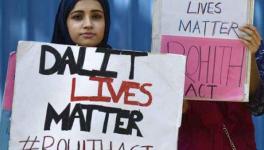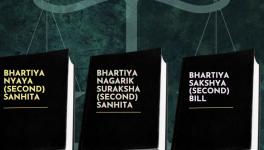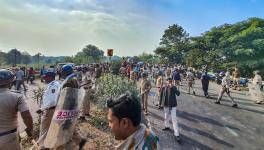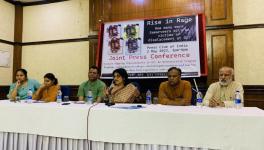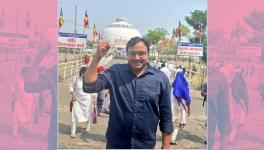Bulandshahr Violence: Blatant Misuse of NSA?
File Photo : Bulandshahr violence: Delhi Taxi Driver Prashant Natt Arrested, Family Cries Foul
The Bulandshahr administration on Monday invoked the National Security Act, 1980 (NSA), against three men arrested for the alleged cow slaughter that triggered the mob violence near Siyana village on December 3, in which Inspector Subodh Kumar Singh and a local, Sumit Kumar, were killed.
The stringent NSA has been invoked against Nadeem, Mahbub and Azhar, who were arrested under sections 3, 5 and 8 of the Uttar Pradesh Prevention of Cow Slaughter Act, 1955. All three are the residents of Siyana in Bulandshahr.
“We have invoked the NSA, as the bail petitions for the accused have come up for hearing. Since the crime they committed on December 3 was the reason behind the violence and disruption of the public peace, we have grounds to believe that if they are allowed to walk free, a similar situation might arise. It has been done to keep such a preventive measure in mind,” said Bulandshahr district magistrate Anuj Jha.
“So far, it is a measure to ensure that no law and order situation arises on the release of an accused,” said Jha. The office of the UP Director General of Police in a notification claimed that the proceedings were initiated because the cow slaughter act caused “terror”, and disturbed peace in the Siyana area.
Interestingly, the Bulandshahr police have arrested more than 35 people for the alleged killing of Inspector Subodh Kumar Singh including key accused Yogesh Raj and Shikhar Agarwal, but the NSA is yet to be invoked against those accused of rioting and murder. According to sources, the administration will consider initiating NSA proceedings as and when the bail hearings of those accused in the mob violence come up.
“The NSA proceedings will be also be initiated against the other accused of cow-slaughter as per their role. The same principle will be applied to the accused in riot and policeman’s murder case. It is under investigation so far,” said Atul Kumar Srivastava, Superintendent of Police (City).
The NSA is a preventive detention law, meaning that detention under the Act is to prevent the commission of an offence, not when an offence has already been committed. Nearly 38 years after its enactment, the NSA’s preventive detention regime remains a convenient tool to obliterate flaws in the Indian criminal justice system, and deprive individuals of their constitutional and statutory rights.
Read more: Bulandshahr Violence: Absconding Bajrang Dal Man Nabbed After a Month
Laws like NSA or preventive detention – which is a part of the Indian Constitution, (unlike any other country in the world) – is arguably a travesty of the fundamental right to personal liberty guaranteed also by the Constitution of India. The irony is that the NSA can be invoked against those who imperil the defence of the State, security of the state, relation of the state with foreign powers, public order and maintenance of essential supplies and services, yet it has been invoked against dissenting voices against the current regime in one way or the other in the recent times.
Ambit of people who have been booked under NSA’s Preventive Detention range from Bhim Army’s chief, Chandrashekhar Azad who was booked under NSA on November 9, 2017 to the recent booking of the Manipuri Journalist. Chandrashekhar, who rose to prominence after Dalits in Saharanpur took on Thakurs and the UP police, was granted bail by the Allahabad High Court in various rioting cases filed against him, and was on the cusp of regaining his freedom when the draconian NSA was invoked against him.
On June 11, 2018 Kaleel Rahman, Mohammed Younis, Mohammed Ishraf, Velmurugan, Saravanan and Sottaiyan were picked up by Tamil Nadu police under suspicion of having resorted to violence during the anti-Sterlite protests in Tuticorin. The six activists were booked under NSA. Or, the case of Manipuri journalist Kishorchandra Wankhem who was booked under NSA on December 14 for posting a video critical of the Manipur’s CM N Biren Singh on social media.
In all these cases, it’s ludicrous that political activists like Chandrashekhar or journalists like Kishorchandra are being construed as a threat to the nation. The NSA allows the government to hold such “serious offenders” in custody without charging them for any of these serious offences.
Expressing his views on the misuse of NSA in the Bulandshahr violence, advocate Mohammad Shoaib, chief of the Rihai Manch, had earlier told Newsclick, "The government is actually trying to weaken the case. If there is no challenge in the public order, you cannot use NSA, but the government is misusing NSA. There are different sections of the IPC (Indian Penal Code), and if police have enough evidence against the accused, they should be booked under IPC sections, not NSA.”
What is even more bizarre is the fact that the three men booked under NSA have been booked because of cow slaughter when it’s not even clear whether cows were slaughtered or not, as allegedly right-wing people landed up with cow carcasses on a tractor trolley, alleging slaughter when Inspector Subodh Singh’s car was reportedly chased into the field where he was shot dead.
Read more: Another Key Accused in Bulandshahr Violence Arrested
Get the latest reports & analysis with people's perspective on Protests, movements & deep analytical videos, discussions of the current affairs in your Telegram app. Subscribe to NewsClick's Telegram channel & get Real-Time updates on stories, as they get published on our website.













